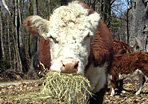
“The roof on my barn is gone, my fences are down, and all my hay is lost.” These were the first words from the first farmer call I received after Hurricane Katrina hit on August 28. Kelli Emenes, who raises cattle with her husband near Covington, Louisiana, described to me how trees ripped from their roots had flattened their fencing, their cattle were wandering in neighboring fields, the hay they had stored to get them through the winter months was destroyed, and power was going to be off for weeks, possibly months. While she and her family suffered no physical harm, the farm they had worked so hard to build up was in ruins, and they needed help fast.
Following Kelli’s call, Farm Aid received many more calls from farmers across Louisiana and Mississippi with stories very similar to Kelli’s. The calls increased several weeks later, when Hurricane Rita slammed into the southwest Louisiana coast, inundating farms as far as twenty miles inland with a tsunami-type storm surge that rose fifteen to twenty feet, washing away thousands of cattle and other livestock.
After the first hurricane, Farm Aid quickly activated its Family Farm Disaster Fund and sent emergency aid and cash to three of its partners in Louisiana and Mississippi: the Louisiana Interchurch Conference (LIC), the Southern Mutual Help Association (SMHA), and the Federation of Southern Cooperatives. These three groups, and their staff, would be responsible for getting Farm Aid emergency assistance in the form of cash and hay for livestock to rural and isolated farmers.
After talking to Kelli Emenes and getting the details of their situation, I immediately called Betty Puckett. Betty, a 20-year veteran farm advocate, is the face of Farm Aid at the Louisiana Interchurch Ministries. She personally speaks with every farmer referred to her by Farm Aid staff, hearing their stories, and distributing the emergency funds provided by Farm Aid. Betty is very experienced in helping farm families through the range of crises farmers face, from access to credit and bank foreclosures to suicide attempts and weather disasters. I knew that Kelli would be in good hands with Betty. After I made sure they were in touch I let Betty do her work with Kelli.
I called Betty and Kelli last week to get a report on where things stood and how they were faring.
“As a farmer myself who had been through rough times, I knew what Louisiana farmers were dealing with,” Betty said. “In times like these, farmers need to know there’s someone out there who understands their situation and can offer concrete help. There was a desperate need to get cash out to these farmers – it was matter of survival.”
Kelli agreed. “We could not get access to our savings. Our local bank, the only one around in this rural area, was closed for several weeks. Power was out for 29 days. The ATM at the bank was inoperable. Getting the cash grant from Farm Aid through Betty was a big boost, both to our day-to-day living situation and to our morale. We used the cash to buy gas to run a generator, which we needed to keep our food from spoiling and to pump drinking water from our well.”
Today, Kelli and her husband are working hard to get back on their feet and to prepare themselves and their farm for the future, not to mention for the next hurricane. “Before, I canned the tomatoes, squash, and cucumbers from our garden for enjoyment. Now, I do it for survival. There’s a much greater ‘preparedness consciousness’ around here – and we’re getting ready for 2006.”
They have been able to take advantage of some of the disaster programs of the U.S. Department of Agriculture that helped them clear their land of the dozens of fallen trees and fix their fences. They have had to tear down one of their two barns while the other remains heavily damaged. Labor is extremely hard to find as many rural residents have gone to New Orleans for higher paying construction jobs, and building materials are scarce.
“As much as folks work to get their lives back together, things are still very tough,” Kelli said. “In some ways, things are more difficult now than before – the emotional toll is now just beginning to be felt. It’s been a long haul, and things have a long way to go to get back to normal. Extended families are living in cramped and damaged homes. Folks are very tired.
“There’s a misperception that only poor folks in the cities were hit hard by the hurricanes and need help. But it’s not just the destitute that need help. We’re not poor – but we, and so any like us, also need help. Throughout this whole experience, I learned that Farm Aid is not only there to help people about to lose their farms – it’s also there for folks like us who needed a helping hand. Farm Aid was there for us.”
While Farm Aid’s hotline is less busy than the days immediately following Katrina and Rita, we still hear from Gulf Coast farmers and their on-going and unmet needs. Farm Aid has convened four farmer trainings across the region to provide farmers the critical information they need to take advantage of federal disaster programs – information that all too often does not get to all farmers.
Every day, Farm Aid connects these farmers to advocates like Betty Puckett at Louisiana Interchurch. “Farming is a special way of life,” Betty told me. “Helping farmers stay on their land and continue farming is a matter of social justice for me. It’s in my blood.”
Learn more about Betty Puckett in this video taken from our Homeplace Under Fire documentary:


